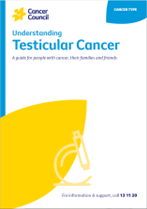- Home
- Testicular cancer
- Managing side effects
- Long-term side effects
Long-term side effects
Treatment for testicular cancer can sometimes lead to long-term side effects. Your doctors will discuss these with you before treatment starts.
Learn more about:
- Effects on the heart and blood vessels
- Risk of other cancers
- Low testosterone levels
- Changes to sex and intimacy
- Effects on fertility
- Effects on body image
Effects on the heart and blood vessels
Having chemotherapy for testicular cancer can affect the heart and blood vessels. This can increase the longer-term risk of developing heart disease, stroke or blood circulation problems. Having high cholesterol levels, high blood pressure, high blood sugar levels or carrying excess weight can increase this risk. Many people can manage their cholesterol and blood pressure levels with regular exercise and a balanced diet.
Other people may be prescribed medicines. Talk to your doctor about whether you need regular heart checks after treatment and ways you can look after your heart and blood circulation. If you develop heart or circulation problems, make sure to let your doctors know you had treatment for testicular cancer.
Risk of other cancers
People who have chemotherapy for testicular cancer are at a slightly higher risk of developing leukaemia, which is a blood cancer. Having chemotherapy may also increase the risk of developing a new unrelated solid cancer. People who have radiation therapy for testicular cancer have a slightly increased risk of developing a second cancer in or near the area exposed to radiation. The risk of developing a second cancer is very low. Talk to your doctors about things you can do to reduce this risk, such as following your surveillance schedule, and exercising, being a health body weight and eating well.
Low testosterone levels
Some people will develop low testosterone levels after treatment for testicular cancer (known as hypogonadism). Having chemotherapy after surgery can increase the risk. Low testosterone levels may cause a range of issues, including tiredness, muscle loss and reduced sex drive. Testosterone levels will be checked as part of follow-up care and some people may need testosterone replacement therapy.
Side effects of treatment for testicular cancer are similar for all people, however, LGBTQI+ people may face some extra challenges – see LGBTQI+ people and cancer.
→ READ MORE: Changes to sex and intimacy
Meditation and relaxation podcast
Listen to more of our meditation and relaxation podcast for people affected by cancer
More resources
Dr Benjamin Thomas, Urological Surgeon, The Royal Melbourne Hospital and The University of Melbourne, VIC; A/Prof Ben Tran, Genitourinary Medical Oncologist, Peter MacCallum Cancer Centre, Walter and Eliza Hall Institute of Medical Research and The University of Melbourne, VIC; Dr Nari Ahmadi, Urologist and Urological Cancer Surgeon, Chris O’Brien Lifehouse, NSW; Helen Anderson, Genitourinary Cancer Nurse Navigator, Gold Coast University Hospital, QLD; Anita Cox, Youth Cancer – Cancer Nurse Coordinator, Gold Coast University Hospital, QLD; Dr Tom Ferguson, Medical Oncologist, Fiona Stanley Hospital, WA; Dr Leily Gholam Rezaei, Radiation Oncologist, Chris O’Brien Lifehouse and Royal Prince Alfred Hospital, NSW; Dheeraj Jain, Consumer; Amanda Maple, 13 11 20 Consultant, Cancer Council SA; Jessica Medd, Senior Clinical Psychologist, Department of Urology, Concord Repatriation General Hospital and Headway Health, NSW.
View the Cancer Council NSW editorial policy.
View all publications or call 13 11 20 for free printed copies.

